Unit5 归纳笔记
新外研版高中英语必修第一册复习笔记Unit 5 Into the wild单元核心考点归纳(学用考)
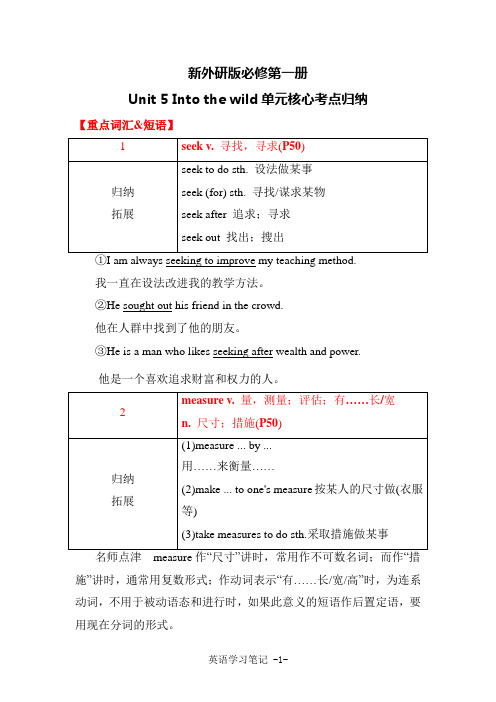
新外研版必修第一册Unit 5 Into the wild单元核心考点归纳【重点词汇&短语】I am always seeking to improve my teaching method.我一直在设法改进我的教学方法。
②He sought out his friend in the crowd.他在人群中找到了他的朋友。
③He is a man who likes seeking after wealth and power.他是一个喜欢追求财富和权力的人。
施”讲时,通常用复数形式;作动词表示“有……长/宽/高”时,为连系动词,不用于被动语态和进行时,如果此意义的短语作后置定语,要用现在分词的形式。
①Either measure the temperature with a bath thermometer or test the water with your wrist.要么用浴用温度计测量水温,要么用手腕试一下。
②The house is more than twenty metres long and measures six metres in width.这座房子长20多米,宽6米。
③Youth is not measured by age but mood.年轻不是用年龄来衡量的,而是一种心境。
④My mother made me a pair of trousers to my measure.我妈妈按照我的尺寸给我做了一条裤子。
Where would be the best position for the lights这些灯装在什么位置最好?②He's going to be in a very difficult position indeed if things go badly for him.如果事情进展不顺利的话,他的处境将非常艰难。
③Money, fame and social position are of no interest to him.他对金钱、名誉和社会地位都不动心。
七年级上册英语unit5笔记

七年级上册英语unit5笔记Unit 5: My School DayIn Unit 5, we will focus on talking about our daily routines and activities at school. We will learn how to describe our school day, including subjects, teachers, and extracurricular activities. This unit will help us improve our vocabulary and grammar skills, as well as develop our speaking and listening abilities in English.1. School Subjects:In this unit, we will learn how to talk about different school subjects in English. We will practice asking and answering questions about our favorite subjects, using expressions like "What's your favorite subject?" and "I like (subject) because...". We will also learn the names of common school subjects, such as English, Math, Science, History, and Geography.2. Daily Routines:We will also learn how to describe our daily routines at school. We will practice using time expressions and action verbs to talk about our daily activities, such as "I wake up at 7 o'clock" or "I have breakfast at 8 o'clock". We will also learn how to use adverbs of frequency, such as always, usually, sometimes, and never, to describe how often we do certain activities.3. Describing Teachers:In this unit, we will learn how to describe our teachers. We will practice using adjectives to talk about their appearance, personality, and teaching style. We will also learn how to ask and answer questions about our teachers, using expressions like "What does your English teacher look like?" and "Is your Science teacher strict or lenient?"4. Extracurricular Activities:We will also learn about extracurricular activities at school. We will learn how to talk about our hobbies, interests, and clubs we join. We will practice using verbs like play, do, and join, and expressions like "I play soccer after school" or "I do art club on Wednesdays". We will also learn how to ask and answer questions about extracurricular activities, such as "What sports do you play?" and "Which club do you join?"5. Giving Opinions:In this unit, we will learn how to express our opinions about school subjects and activities. We will practice using adjectives and adverbs to describe our preferences and opinions, such as "I think Math is difficult" or "I really enjoy playing basketball". Wewill also learn how to ask for opinions, using expressions like "What do you think about Science?" and "Do you like doing homework?"Overall, Unit 5 will help us develop our English language skills by focusing on daily routines, school subjects, describing teachers, extracurricular activities, and expressing opinions. By the end of this unit, we will be able to confidently talk about our school day and engage in conversations about school-related topics. Let's get ready to improve our English skills and have fun in Unit 5!。
八下英语五单元笔记
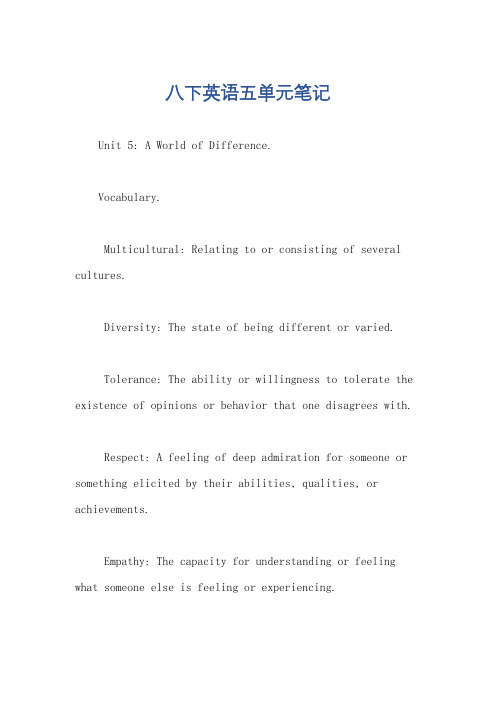
八下英语五单元笔记Unit 5: A World of Difference.Vocabulary.Multicultural: Relating to or consisting of several cultures.Diversity: The state of being different or varied.Tolerance: The ability or willingness to tolerate the existence of opinions or behavior that one disagrees with.Respect: A feeling of deep admiration for someone or something elicited by their abilities, qualities, or achievements.Empathy: The capacity for understanding or feeling what someone else is feeling or experiencing.Grammar.Present perfect tense: Used to describe actions or events that started in the past and continue to the present or have recently finished.Past perfect tense: Used to describe actions or events that happened before another action or event in the past.Comparative and superlative adjectives: Used to compare two or more things or people.Reading Comprehension.Passage 1: The Importance of Cultural Diversity.Cultural diversity is essential for a thriving and vibrant society. It brings together people from different backgrounds, experiences, and perspectives, creating a rich tapestry of traditions, beliefs, and values. Each culture contributes its unique flavor to the collective whole, making it more dynamic and resilient.Diversity promotes creativity and innovation. When people from diverse backgrounds come together, they share their ideas and perspectives, leading to new and innovative solutions. It also fosters tolerance and understanding. By interacting with people from different cultures, we develop empathy and a greater appreciation for the ways of lifethat differ from our own.Furthermore, cultural diversity is crucial for economic prosperity. It attracts global talent and investment, creating jobs and stimulating economic growth. It also helps businesses cater to diverse customer bases and expand into new markets.Passage 2: The Challenges of Cultural Diversity.While cultural diversity offers many benefits, it also presents challenges. Differences in language, customs, and beliefs can lead to misunderstandings, conflicts, and even discrimination. Prejudice and stereotypes can hinder communication and cooperation.Overcoming these challenges requires active effort and a commitment to respect and tolerance. It involves educating ourselves about different cultures, listening to others' perspectives, and valuing their contributions. By fostering empathy and open-mindedness, we can create a society where everyone feels included and respected.Listening.Dialogue 1: A Conversation about Cultural Diversity.Speaker 1: I think cultural diversity is so important. It makes our society so much more interesting and vibrant.Speaker 2: I agree. It's fascinating to learn about different cultures and traditions.Speaker 1: But it can also be challenging sometimes. Different cultures have different values and beliefs, which can lead to misunderstandings.Speaker 2: That's true. But I think it's important to try to understand and respect each other's differences.Dialogue 2: A Discussion about the Challenges of Diversity.Speaker 1: I'm worried about the challenges of diversity. I think it can lead to division and conflict.Speaker 2: I can understand your concerns. But I believe that the benefits of diversity outweigh the challenges.Speaker 1: Maybe you're right. But I think we need to be careful to avoid letting our differences divide us.Speaker 2: I agree. We need to work together to create a society where everyone feels included and respected.Speaking.Discussion Topics.The importance of cultural diversity in society.The challenges of cultural diversity and how to overcome them.Personal experiences with cultural diversity.Presentation Tips.Choose a topic that you are passionate about.Research your topic thoroughly.Organize your ideas clearly and logically.Use vivid language and examples to engage your audience.Practice your presentation several times.Be confident and enthusiastic.。
河南省九年级英语全册Unit5Whataretheshirtsmadeof重点归纳笔记
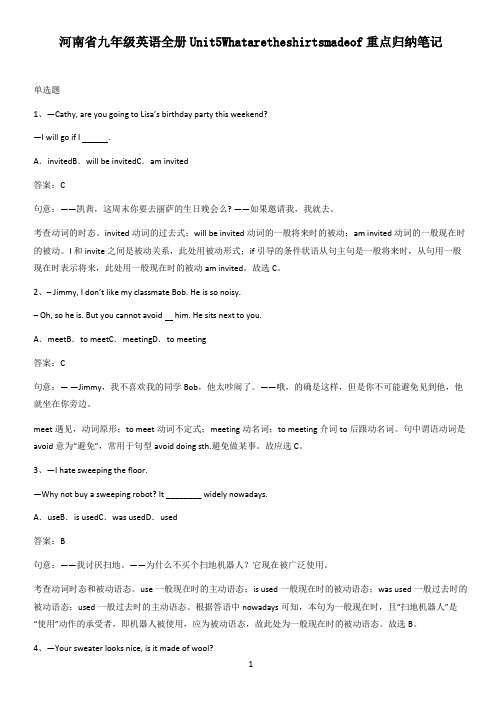
河南省九年级英语全册Unit5Whataretheshirtsmadeof重点归纳笔记单选题1、—Cathy, are you going to Lisa’s birthday party this weekend?—I will go if I .A.invitedB.will be invitedC.am invited答案:C句意:——凯茜,这周末你要去丽萨的生日晚会么? ——如果邀请我,我就去。
考查动词的时态。
invited动词的过去式;will be invited动词的一般将来时的被动;am invited动词的一般现在时的被动。
I和invite之间是被动关系,此处用被动形式;if引导的条件状语从句主句是一般将来时,从句用一般现在时表示将来,此处用一般现在时的被动am invited。
故选C。
2、– Jimmy, I don’t like my classmate Bob. He is so noisy.– Oh, so he is. But you cannot avoid him. He sits next to you.A.meetB.to meetC.meetingD.to meeting答案:C句意:——Jimmy,我不喜欢我的同学Bob,他太吵闹了。
——哦,的确是这样,但是你不可能避免见到他,他就坐在你旁边。
meet遇见,动词原形;to meet动词不定式;meeting动名词;to meeting介词to后跟动名词。
句中谓语动词是avoid意为“避免”,常用于句型avoid doing sth.避免做某事。
故应选C。
3、—I hate sweeping the floor.—Why not buy a sweeping robot? It ________ widely nowadays.A.useB.is usedC.was usedD.used答案:B句意:——我讨厌扫地。
Unit 5知识要点归纳

Unit 5 Can you e to my party?1. have to 与情态动词的区别情态动词不能单独作谓语,后面必须接动词原形一起构成谓语,have to 也是这样。
情态动词没有人称和数的变化,而且所用的时态也受到一定的限制,但是have to 有人称和数的变化,可用于多种时态中,在一般现在时中,当主语是第三人称单数时,要用has to, 其余人称用have to;一般过去时中用had to;一般将来时中用will have to, 例如:She has to go to school by bus.她不得不乘公共汽车去上学。
If you get ill, you'll have to see the doctor.如果你生病的话,你就得看医生。
2. have to 与must 的区别have to 和must 都有“必须”的意思,那么它们有哪些不同呢?(1) 含义和用法上的区别:have to 强调客观上需要做某事,即表示外界条件的需要不得不做某事,含有“形势逼迫”的意味;must 强调说话者主观上认为必须做某事,含有“主观判断”的意味,例如:My bike was broken on my way to school. I had to walk there.我的自行车在上学的路上坏了,我不得不走路去上学。
(我本来不愿意走路,可是自行车坏了,不想走路也不行。
)We must learn English well.我们必须学好英语。
(主观上有这种想法。
)(2) 否定式的区别:have to 的否定式意为“不必”,must的否定式意为“禁止;不允许”。
因此,以must 开头的一般疑问句的肯定回答为“Yes, 主语+must”,否定回答为“No, 主语+needn't / don't have to”。
例如:---Must I finish the homework now? 我必须现在完成作业吗?---Yes, you must. (No, you needn't / don't have to) 是的,你必须现在完成。
高二英语必修五unit5笔记整理
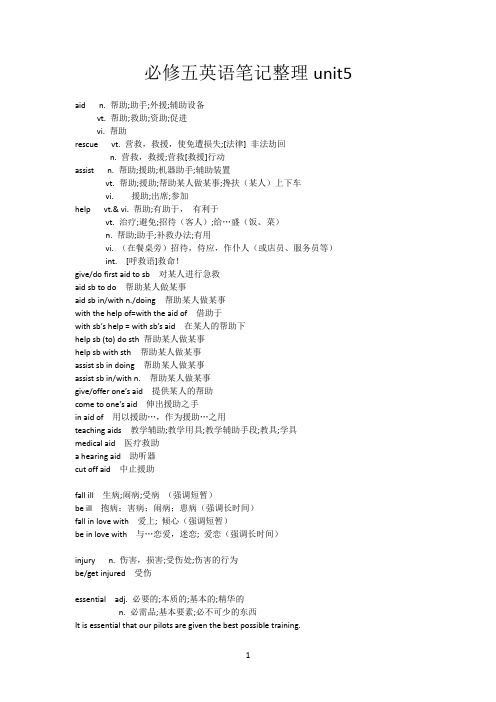
必修五英语笔记整理unit5aid n. 帮助;助手;外援;辅助设备vt. 帮助;救助;资助;促进vi. 帮助rescue vt. 营救,救援,使免遭损失;[法律] 非法劫回n. 营救,救援;营救[救援]行动assist n. 帮助;援助;机器助手;辅助装置vt. 帮助;援助;帮助某人做某事;搀扶(某人)上下车vi. 援助;出席;参加help vt.& vi. 帮助;有助于,有利于vt. 治疗;避免;招待(客人);给…盛(饭、菜)n. 帮助;助手;补救办法;有用vi. (在餐桌旁)招待,侍应,作仆人(或店员、服务员等)int. [呼救语]救命!give/do first aid to sb 对某人进行急救aid sb to do 帮助某人做某事aid sb in/with n./doing 帮助某人做某事with the help of=with the aid of 借助于with sb’s help = with sb’s aid 在某人的帮助下help sb (to) do sth 帮助某人做某事help sb with sth 帮助某人做某事assist sb in doing 帮助某人做某事assist sb in/with n. 帮助某人做某事give/offer one’s aid 提供某人的帮助come to one’s aid 伸出援助之手in aid of 用以援助…,作为援助…之用teaching aids 教学辅助;教学用具;教学辅助手段;教具;学具medical aid 医疗救助a hearing aid 助听器cut off aid 中止援助fall ill 生病;闹病;受病(强调短暂)be ill 抱病;害病;闹病;患病(强调长时间)fall in love with 爱上; 倾心(强调短暂)be in love with 与…恋爱,迷恋; 爱恋(强调长时间)injury n. 伤害,损害;受伤处;伤害的行为be/get injured 受伤essential adj. 必要的;本质的;基本的;精华的n. 必需品;基本要素;必不可少的东西It is essential that our pilots are given the best possible training.我们的飞行员必须接受最好的训练。
仁爱版七年级英语下册unit5知识点
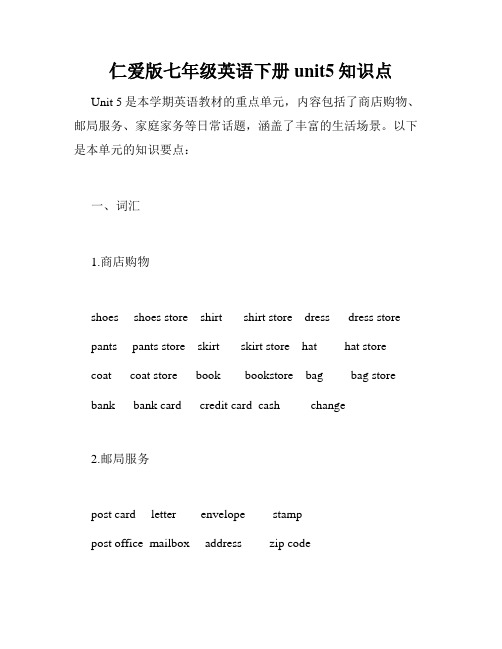
仁爱版七年级英语下册unit5知识点Unit 5是本学期英语教材的重点单元,内容包括了商店购物、邮局服务、家庭家务等日常话题,涵盖了丰富的生活场景。
以下是本单元的知识要点:一、词汇1.商店购物shoes shoes store shirt shirt store dress dress storepants pants store skirt skirt store hat hat storecoat coat store book bookstore bag bag storebank bank card credit card cash change2.邮局服务post card letter envelope stamppost office mailbox address zip code3.家庭家务clean clean up sweep mopwash laundry fold drydish do the dishes set the table clear the table二、重点语法本单元的语法重点是一般现在时和there be句型的运用。
1.一般现在时一般现在时通常用来表示反复发生的动作、习惯性的行为或者现在的状态。
它的构成方式是主语+动词原形+其他。
注意第三人称单数形式应该在动词后面加上“s”。
例如:I often go shopping on weekends. (我经常在周末去购物。
)She always buys books in the bookstore. (她总是在书店买书。
)2.there be句型there be句型用来表示某地或某处有某物。
当表示单数或者不可数名词时,应该用there is;当表示复数名词时,应该用there are。
例如:There is a bank in front of the bookstore. (书店前面有一家银行。
)There are some chairs in the classroom. (教室里有一些椅子。
郑州市九年级英语全册Unit5Whataretheshirtsmadeof重点归纳笔记

郑州市九年级英语全册Unit5Whataretheshirtsmadeof重点归纳笔记单选题1、Silver Tea leaves__________ by hand in Junshan Island.A.is pickedB.are pickedC.picks答案:B句意:在君山岛上人们用手采摘银针。
考查动词的时态和语态以及主谓一致。
is picked动词的一般现在时的被动,主语是单数;are picked动词的一般现在时的被动;picks动词的一般现在时的第三人称单数。
主语leaves叶子是复数名词;主语和动词pick之间是被动,用are picked表示“被采摘”。
故选B。
2、I find ________ is very exciting for me to go camping in the open air.A.itB.thisC.oneD.that答案:A句意:我发现在户外露营对我来说是非常令人兴奋的。
考查代词辨析。
it它;this这个,指较近的事物;one一个;that那个,指较远的事物。
根据“I find...is very exciting for me to go camping”可知,此处考查find后加宾语从句的结构,在宾从中,it作形式主语,真正的主语是后面的“to go camping”,故选A。
3、—Are there any ________ in your school?—Yes,there are.A.GermenB.GermansC.GermanD.Germany答案:B句意:——你学校里有一些的国人吗?——是的,有一些。
German德国人,复数形式是Germans;Germany德国;故选B4、Mom, I'm very _________ for all your love.A.thankfulB.carefulC.usefulD.helpful答案:A试题分析:句意:妈妈,我非常感谢你所有的爱。
- 1、下载文档前请自行甄别文档内容的完整性,平台不提供额外的编辑、内容补充、找答案等附加服务。
- 2、"仅部分预览"的文档,不可在线预览部分如存在完整性等问题,可反馈申请退款(可完整预览的文档不适用该条件!)。
- 3、如文档侵犯您的权益,请联系客服反馈,我们会尽快为您处理(人工客服工作时间:9:00-18:30)。
Unit five Helping our parents (1)
1. 我们之前只学习过一种英语时态:一般现在时;表示习惯性、经
常性或有规律的行为。
常用时态标记如:always, usually, often,
sometimes, seldom, never, everyday, every Saturday等。
2. 一般现在时也在特定的地方使用:常见的科学事实、剧本写作、
飞机和火车时刻表等。
(另外,没有上下文提示词时,我们也通
常会使用一般现在时完成动词填空。
)
The moon goes around the Earth.
Cinderella puts on the new clothes.
The plane takes off at 3pm.
He is a boy. He likes cooking. He can cook nice food.
3. 本单元我们将接触到第二种英语时态:现在进行时;表示动作发
生在当下说话的时候(at the time of speaking)。
常用时态标
记:now。
结构形式:BE(am/is/are)+ 现在分词(doing)。
4. 现在分词的形式和动名词是一样的,即:doing。
在动词加ing时
分三种情况:1)大多数动词都是直接加ing; 2) 不发音的e结尾的
动词要去e加ing: riding, having, driving, leaving; 3)重读闭音节
动词要双些尾字母再加ing: stopping, sitting, putting, getting,
beginning, chatting等。
*重读闭音节:以一个元音字母加一个辅音字母结尾且重读。
Unit five Helping our parents (2)
1. wash, brush, watch这些ch, sh结尾的动词,一般现在时三单变位要加es。
2. fruit表示水果时,不可数;表示水果种类时,可数。
(fish表示鱼时不可数;表示各种鱼类时是可数)
3. people, clothes常做复数;sheep是单复数同形;police, Chinese, class是集体名词。
4. pay attention to sth/ doing sth 注意某物、某行为(to是介词)
watch the flowers growing看着花朵绽放(growing表示进行)
listen to the wind blowing 听着风声吹拂 ( blowing表示进行)
go away 走开 We’ll all have tea. 我们将一起喝茶。
5. like doing表示长久的喜爱做某事、是一种爱好;
like to do倾向于表示某次喜爱做某事,可能是一时兴起。
(类似would like to do/ want to do/ be happy to do)
6. sweet 做形容词(adi.)表示甜的;作名词(n.)表示糖果, 常做
sweets。
7. to be continued 未完待续 name some housework 说出一些家务的
名称(housework不可数)
8. 一般现在时的一般疑问句:主语和be动词对调:Are you
sleeping?/ Is he having an English lesson?
9. 一般现在时的特殊疑问句:What is/ are …doing?。
